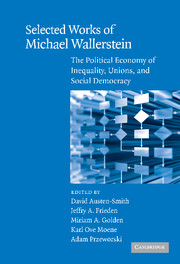 Selected Works of Michael Wallerstein
Selected Works of Michael Wallerstein Published online by Cambridge University Press: 27 January 2010
The three articles included in this part reflect the intellectual preoccupations of the time when they were written. But they approached classical questions with new instruments of analysis and generated new answers.
The first puzzle they address concerns the strategies of labor movements under democratic conditions. What motivated this puzzle was the belief, held in the nineteenth century by thinkers across the entire political spectrum, from Thomas Macaulay to Karl Marx, that if workers were to gain political rights in the form of suffrage, they would use this right to confiscate property. Alternatively, if they were to win the right to freely associate, they would destroy productive property by making confiscatory wage demands. The conflict between capital and labor, Marx maintained, was irreconcilable. Even if the economy grew, “profit and wages remain as before in inverse proportions” (Marx 1952a: 37). In turn, Marx (1934, 1952b) and most of his followers expected that, faced with the threat of confiscation by the working class, the bourgeoisie would inevitably turn for protection to arms, and thus subvert democracy. Capitalism and democracy, therefore, could not coexist. Capitalist democracy could be “only the political form of revolution of bourgeois society and not its conservative form of life” (Marx 1934: 18), “only a spasmodic, exceptional state of things … impossible as the normal form of society” (Marx 1971: 198).
Yet they did coexist, uneasily in some countries at times, but quite peacefully and smoothly in several countries of Europe.
To save this book to your Kindle, first ensure [email protected] is added to your Approved Personal Document E-mail List under your Personal Document Settings on the Manage Your Content and Devices page of your Amazon account. Then enter the ‘name’ part of your Kindle email address below. Find out more about saving to your Kindle.
Note you can select to save to either the @free.kindle.com or @kindle.com variations. ‘@free.kindle.com’ emails are free but can only be saved to your device when it is connected to wi-fi. ‘@kindle.com’ emails can be delivered even when you are not connected to wi-fi, but note that service fees apply.
Find out more about the Kindle Personal Document Service.
To save content items to your account, please confirm that you agree to abide by our usage policies. If this is the first time you use this feature, you will be asked to authorise Cambridge Core to connect with your account. Find out more about saving content to Dropbox.
To save content items to your account, please confirm that you agree to abide by our usage policies. If this is the first time you use this feature, you will be asked to authorise Cambridge Core to connect with your account. Find out more about saving content to Google Drive.